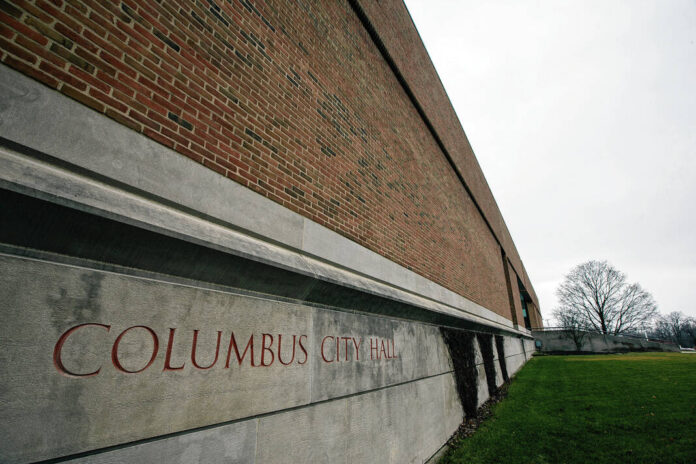City officials have taken the first step toward approving a major tax abatement for a company that promises to provide infrastructure for high-speed internet.
Columbus City Council has unanimously approved a resolution that declares a citywide Economic Revitalization Area (ERA) requested by Hoosier Networks, LLC, qualifies personal property for a tax abatement, and sets the time and place for a public hearing on the matter.
The actual abatement was not voted on at Tuesday’s council meeting. According to Assistant Director of Community Development Robin Hilber, the next step is for the council to consider a confirmatory resolution on July 19 and hold a public hearing. Assuming the confirmatory resolution is approved, the property tax abatement would be voted on that same night.
The proposed abatement is part of efforts to create a fiber-to-home network throughout the city of Columbus. The Columbus Board of Works approved a 30-year master development agreement with Meridiam Infrastructure North America Corp. for the project in late June. City officials have said that the network will reach at least 85% of the city, and the company will contract with an internet service provider rather than being the provider itself.
The proposed economic revitalization area in the company’s request encompasses the entire city. According to a letter from Meridiam Senior Investment Director Nick Phillips, Hoosier Networks is requesting a 20-year tax abatement on net new taxes for the installation of new, qualifying equipment. Hoosier Networks is owned by Meridiam, said Hilber.
Phillips said that the “fiber to the premise” network will support high-speed internet for both homes and businesses within the city. The project calls for the installation of new IT equipment, which in turn necessitates an investment of approximately $28 million. According to the company’s application, this investment will take place over “a several year period” starting in 2022.
According to city documents, the tax deduction — if approved — would be 95% on an annual basis. It’s calculated that this would allow Hoosier Networks to save almost $4.6 million in property taxes over 20 years, with the company paying a little over $240,000 in taxes during that same period. However, Hilber told The Republic that this initial calculation may be “overstated.”
She said that the request to a declare a citywide ERA is unusual and unprecedented. It is being sought because the fiber will be laid in right-of-way throughout the city.
“Any company that comes in that wants to install personal property would go ahead and have to make application once again,” she told city council. “So it’s not as if they would automatically get a tax abatement; they would have to make application to city council. So you would continue to hear those tax incentive applications. But it would only be for personal property, not for real property.”
Approving the citywide ERA merely means that other businesses wouldn’t have to go through the initial step of seeking an ERA declaration for personal property tax abatement requests, she concluded.
Hilber also wrote in a memo to city council that while the abatement will not provide additional employment, Hoosier Networks will hire a community outreach specialist to market high-speed internet to households throughout the the city with a special emphasis on low-income families that are eligible for the Affordable Connectivity Program.
“This program will provide internet speed of up to 250mbps (megabits per second)/250mbps with a subsidy from the federal government covering the cost,” said Hilber. “Speeds up to 1gb (gigabits per second)/1gb can be purchased for an additional cost.”
In regards to an internet service provider, Phillips said that Meridiam will initially have an exclusive contract with one ISP. The contract will be for five years with the option for two one-year extensions, making the maximum term seven years.
“And then basically it (the fiber) would be open to anybody that wanted to provide services to those individuals, correct?” asked Councilman Tom Dell.
“Correct,” said Phillips. “But I mean, there will be service level agreements and all of these things, basic things. So we need to ensure some level of quality. But yes, it’s not — it won’t be limited.”





